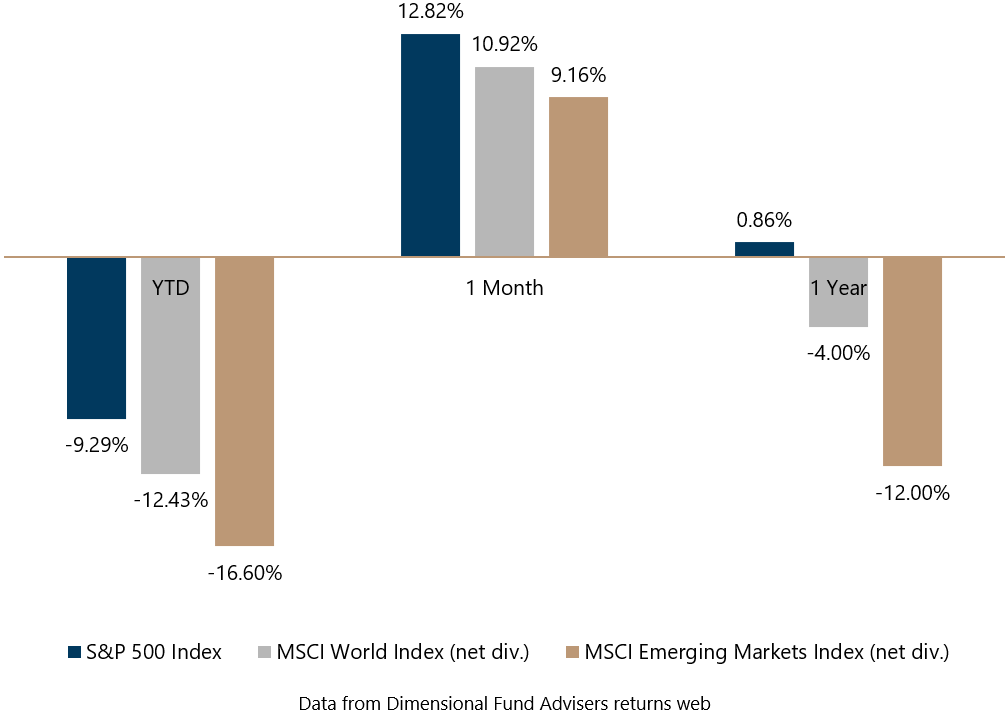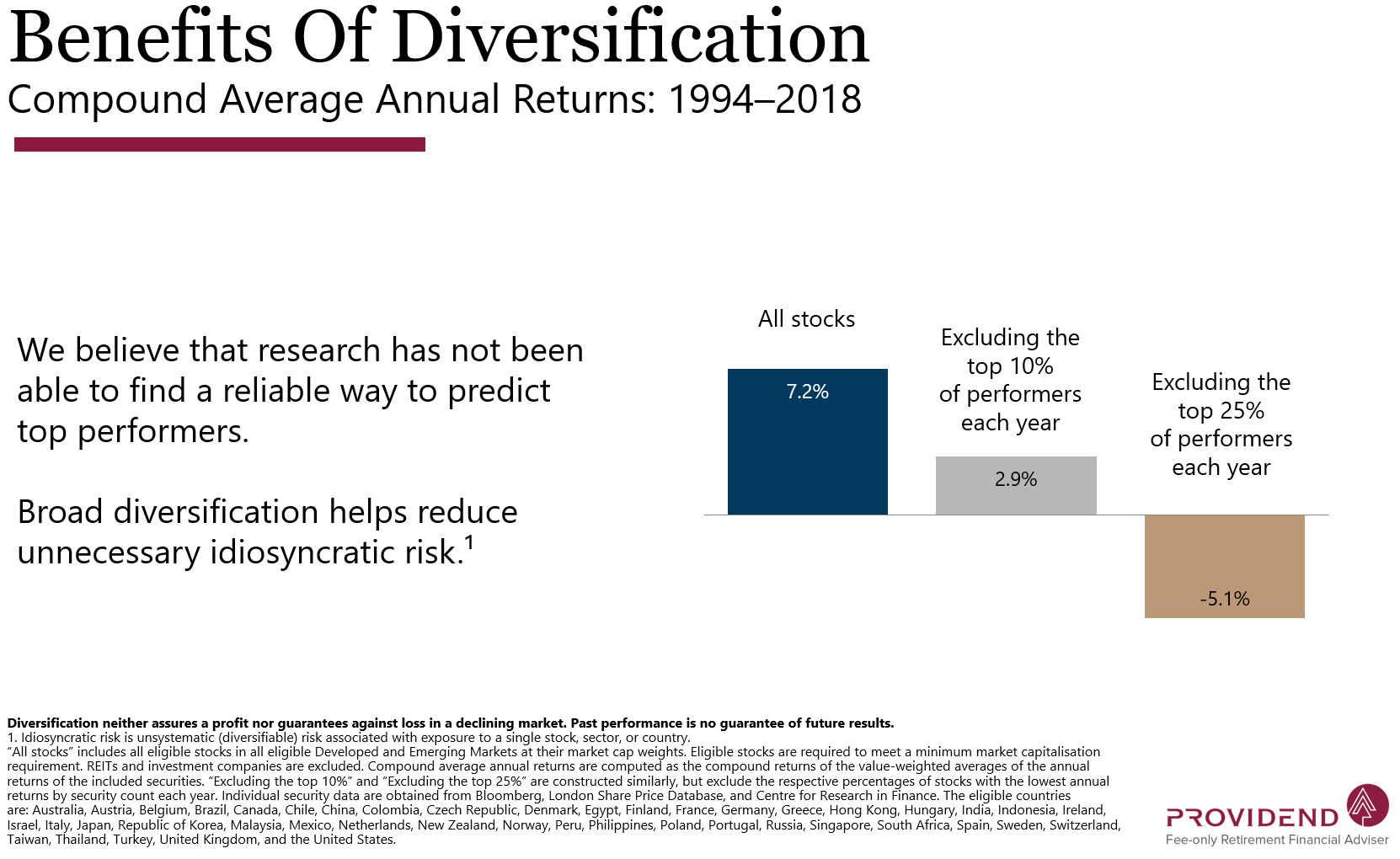This week marks the 4th week or mid-point of Singapore’s circuit breaker period which began on 7th April. It is a time that is unprecedented in our history, with the streets rather empty of cars, the malls almost deserted, and the restaurants and tourist areas all quiet. After the stress of March, where markets suffered their worst period since 2008, April provided a welcome respite as volatility eased and markets started to focus on the impact of the coronavirus pandemic, both to national economies and to the bottom line of companies.

Exhibit 1: Major Index performance YTD, 1 month and 1 year ending 30th Apr 2020. (In USD)
Referencing exhibit 1 above, the 1-month performance represents how markets did in April. As we can see, stocks continued to recover in April, with the S&P 500 leading the way as it went up 12.82%, followed by MSCI World rising 10.92% and MSCI Emerging markets rising 9.16%. This is a continuation of the rebound that started on 23rd March. Year to date, the S&P 500 is now down 9.29% as of the end of April, and one-year performance is even positive at 0.86%!
While stocks were up in April, economic data was lower. The US economy contracted by 4.8% in 1Q 2020, its largest fall since 4Q 2008 (2Q 2020 is expected to be worse). The Eurozone fell 14.4% in the 1Q 2020, the largest fall since World War II. China’s GDP fell 6.8% in 1Q 2020, as all the largest economies in the world suffered from shutdowns to limit the spread of the coronavirus. Singapore’s GDP fell an annualised 10.6% in 1Q 2020, as a dramatic reduction in tourism and business travel impacted our economy. (Not to panic, we have seen numbers like this in 1998 and 2009). Highlighting the economic impact is the lack of demand for oil as oil futures traded in the negative for a day as traders were desperate to pay to have oil taken off their hands as they did not have enough storage, leading some to jest that in 2020, 1 roll of toilet paper is worth more than a barrel of oil.
How then do we explain how stocks did in April as we enter one of the worst recessions in history? Let’s look at 3 points of consideration.
- There is always uncertainty in investing, and markets are trying to find the appropriate price given the available information. When the pandemic hit Europe and the US, markets reacted by falling 30%, as there were many unknowns and lots of uncertainty on the direction of the economy and the spread of the virus. After more than a month of lockdowns, and with more data on the spread of the coronavirus, investors are now pricing in a more optimistic picture that while deep, the recession will be short and recovery will be fast, similar to how economies recover after a natural disaster like an earthquake or tsunami.
- There is new information coming in every day, so the situation can change quickly. While there has been optimism that economies will start to re-open in May, there is still uncertainty about how a relaxation of social distancing measures will affect the spread of the virus. Companies are also continuing to report 1Q numbers and give guidance (or no guidance in most cases) for 2Q and beyond, and this adds to further uncertainty for stocks as investors price in the new information. It is challenging to value a stock if a company cannot reliably estimate how its business will perform (in this case due to factors largely outside of the control of management). Even though April was a good month for stocks, it does not mean stocks will not fall in the coming months as new information gets priced in.
- Given all the uncertainty, how should we think about investing? Despite all the uncertainties, staying in a broadly diversified global portfolio is one of the best ways to invest in the current situation. Certain industries like airlines, hospitality and banks have been hard hit by the pandemic, as travel and leisure spending has been curtailed by all the movement restrictions. Conversely, grocery stores (eg Walmart), e-commerce and makers of consumer staples have seen one of the best quarters of business in a long time as spending habits shifted due to the various economic lockdowns. Not to mention digital streaming services like Netflix that reported large US subscriber growth. While not yet impacting their business, pharma companies stock prices have also done well as investors focus on the development of treatments and vaccines for COVID-19.
Staying diversified allows our portfolios to benefit from the companies that are doing well in the current environment, countering the impact of the companies that are not doing so well in our portfolios. Looking at Exhibit 2 below, we can see that not owning the top 10% of performers each year will impact returns by around 4% annualised. Given that we have no way to consistently pick the best performers, staying globally diversified is a good strategy to make sure our portfolios own them.

Exhibit 2: Stock performance with and without the top 10% of performers.
Looking ahead, it really will be all about how countries move to reopen their economies and manage the spread of the coronavirus until either a vaccine is found, or the world starts to develop some resistance to the effects of the virus. There will continue to be uncertainty, and there will continue to be ups and downs in the stock market (this is true in all periods).
So far, there has been unprecedented support from central banks and governments to mitigate the economic impact so that companies and people will be able to recover from the recession. The Fed has even committed to buying high yield bonds of firms that have been downgraded and high yield bond ETFs, providing support for one of the most stressed parts of the financial market. The ECB, likewise, is considering adding junk bonds to its asset purchase program. In Singapore, we have had 3 budgets in the space of 3 months as our government looks to tide us through the worst period of the crisis. There is optimism that given the scale of the support from governments and central banks, the world can avoid a depression scenario as we seek a solution to the coronavirus.
As we head into the next 4 weeks of the circuit breaker period, we encourage you to take care of your physical and mental health and to engage with your adviser in times of uncertainty. They might not be able to meet you, but they are only a video call away right now and are happy to update you on any questions you might have on the portfolios or the current situation in the markets. Thank you.
Warmest Regards,
Solutions & Investment Team
We do not charge a fee at the first consultation meeting. If you would like an honest second opinion on your current estate plan, investment portfolio, financial and/or retirement plan, make an appointment with us today.

